Ethical Risks and Mitigation Strategies: HSBC Sri Lanka Report
VerifiedAdded on 2022/04/18
|7
|2311
|76
Report
AI Summary
This report provides an in-depth analysis of ethical risks within HSBC Sri Lanka, a multinational financial institution. The study highlights key ethical concerns identified through internal surveys, including toxic work cultures, lack of empathy from leaders, peer pressure to meet sales targets, and inadequate attention to employee mental health. The report explores the impact of these risks on employee morale and turnover, referencing relevant academic literature. It examines various ethical theories, such as utilitarianism, Kantian ethics, and virtue theory, to provide a theoretical framework for understanding the identified issues. Furthermore, the report proposes practical solutions, including ethical training, fostering a culture of integrity, implementing reporting systems for unethical behavior, and continuous monitoring of ethical concerns. The conclusion emphasizes the importance of addressing these risks to maintain employee well-being and organizational performance, particularly in the context of changing work dynamics.
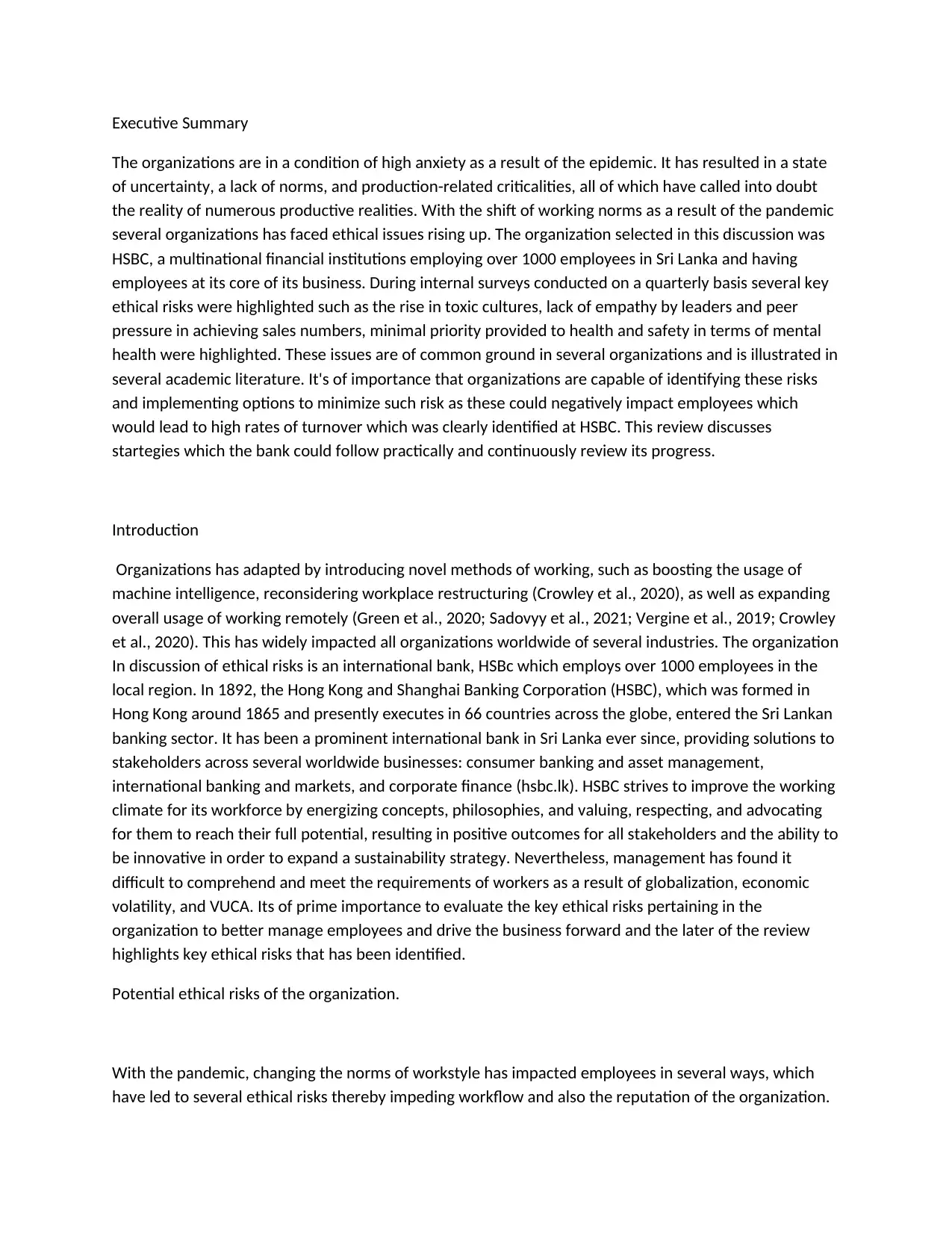
Executive Summary
The organizations are in a condition of high anxiety as a result of the epidemic. It has resulted in a state
of uncertainty, a lack of norms, and production-related criticalities, all of which have called into doubt
the reality of numerous productive realities. With the shift of working norms as a result of the pandemic
several organizations has faced ethical issues rising up. The organization selected in this discussion was
HSBC, a multinational financial institutions employing over 1000 employees in Sri Lanka and having
employees at its core of its business. During internal surveys conducted on a quarterly basis several key
ethical risks were highlighted such as the rise in toxic cultures, lack of empathy by leaders and peer
pressure in achieving sales numbers, minimal priority provided to health and safety in terms of mental
health were highlighted. These issues are of common ground in several organizations and is illustrated in
several academic literature. It's of importance that organizations are capable of identifying these risks
and implementing options to minimize such risk as these could negatively impact employees which
would lead to high rates of turnover which was clearly identified at HSBC. This review discusses
startegies which the bank could follow practically and continuously review its progress.
Introduction
Organizations has adapted by introducing novel methods of working, such as boosting the usage of
machine intelligence, reconsidering workplace restructuring (Crowley et al., 2020), as well as expanding
overall usage of working remotely (Green et al., 2020; Sadovyy et al., 2021; Vergine et al., 2019; Crowley
et al., 2020). This has widely impacted all organizations worldwide of several industries. The organization
In discussion of ethical risks is an international bank, HSBc which employs over 1000 employees in the
local region. In 1892, the Hong Kong and Shanghai Banking Corporation (HSBC), which was formed in
Hong Kong around 1865 and presently executes in 66 countries across the globe, entered the Sri Lankan
banking sector. It has been a prominent international bank in Sri Lanka ever since, providing solutions to
stakeholders across several worldwide businesses: consumer banking and asset management,
international banking and markets, and corporate finance (hsbc.lk). HSBC strives to improve the working
climate for its workforce by energizing concepts, philosophies, and valuing, respecting, and advocating
for them to reach their full potential, resulting in positive outcomes for all stakeholders and the ability to
be innovative in order to expand a sustainability strategy. Nevertheless, management has found it
difficult to comprehend and meet the requirements of workers as a result of globalization, economic
volatility, and VUCA. Its of prime importance to evaluate the key ethical risks pertaining in the
organization to better manage employees and drive the business forward and the later of the review
highlights key ethical risks that has been identified.
Potential ethical risks of the organization.
With the pandemic, changing the norms of workstyle has impacted employees in several ways, which
have led to several ethical risks thereby impeding workflow and also the reputation of the organization.
The organizations are in a condition of high anxiety as a result of the epidemic. It has resulted in a state
of uncertainty, a lack of norms, and production-related criticalities, all of which have called into doubt
the reality of numerous productive realities. With the shift of working norms as a result of the pandemic
several organizations has faced ethical issues rising up. The organization selected in this discussion was
HSBC, a multinational financial institutions employing over 1000 employees in Sri Lanka and having
employees at its core of its business. During internal surveys conducted on a quarterly basis several key
ethical risks were highlighted such as the rise in toxic cultures, lack of empathy by leaders and peer
pressure in achieving sales numbers, minimal priority provided to health and safety in terms of mental
health were highlighted. These issues are of common ground in several organizations and is illustrated in
several academic literature. It's of importance that organizations are capable of identifying these risks
and implementing options to minimize such risk as these could negatively impact employees which
would lead to high rates of turnover which was clearly identified at HSBC. This review discusses
startegies which the bank could follow practically and continuously review its progress.
Introduction
Organizations has adapted by introducing novel methods of working, such as boosting the usage of
machine intelligence, reconsidering workplace restructuring (Crowley et al., 2020), as well as expanding
overall usage of working remotely (Green et al., 2020; Sadovyy et al., 2021; Vergine et al., 2019; Crowley
et al., 2020). This has widely impacted all organizations worldwide of several industries. The organization
In discussion of ethical risks is an international bank, HSBc which employs over 1000 employees in the
local region. In 1892, the Hong Kong and Shanghai Banking Corporation (HSBC), which was formed in
Hong Kong around 1865 and presently executes in 66 countries across the globe, entered the Sri Lankan
banking sector. It has been a prominent international bank in Sri Lanka ever since, providing solutions to
stakeholders across several worldwide businesses: consumer banking and asset management,
international banking and markets, and corporate finance (hsbc.lk). HSBC strives to improve the working
climate for its workforce by energizing concepts, philosophies, and valuing, respecting, and advocating
for them to reach their full potential, resulting in positive outcomes for all stakeholders and the ability to
be innovative in order to expand a sustainability strategy. Nevertheless, management has found it
difficult to comprehend and meet the requirements of workers as a result of globalization, economic
volatility, and VUCA. Its of prime importance to evaluate the key ethical risks pertaining in the
organization to better manage employees and drive the business forward and the later of the review
highlights key ethical risks that has been identified.
Potential ethical risks of the organization.
With the pandemic, changing the norms of workstyle has impacted employees in several ways, which
have led to several ethical risks thereby impeding workflow and also the reputation of the organization.
Paraphrase This Document
Need a fresh take? Get an instant paraphrase of this document with our AI Paraphraser
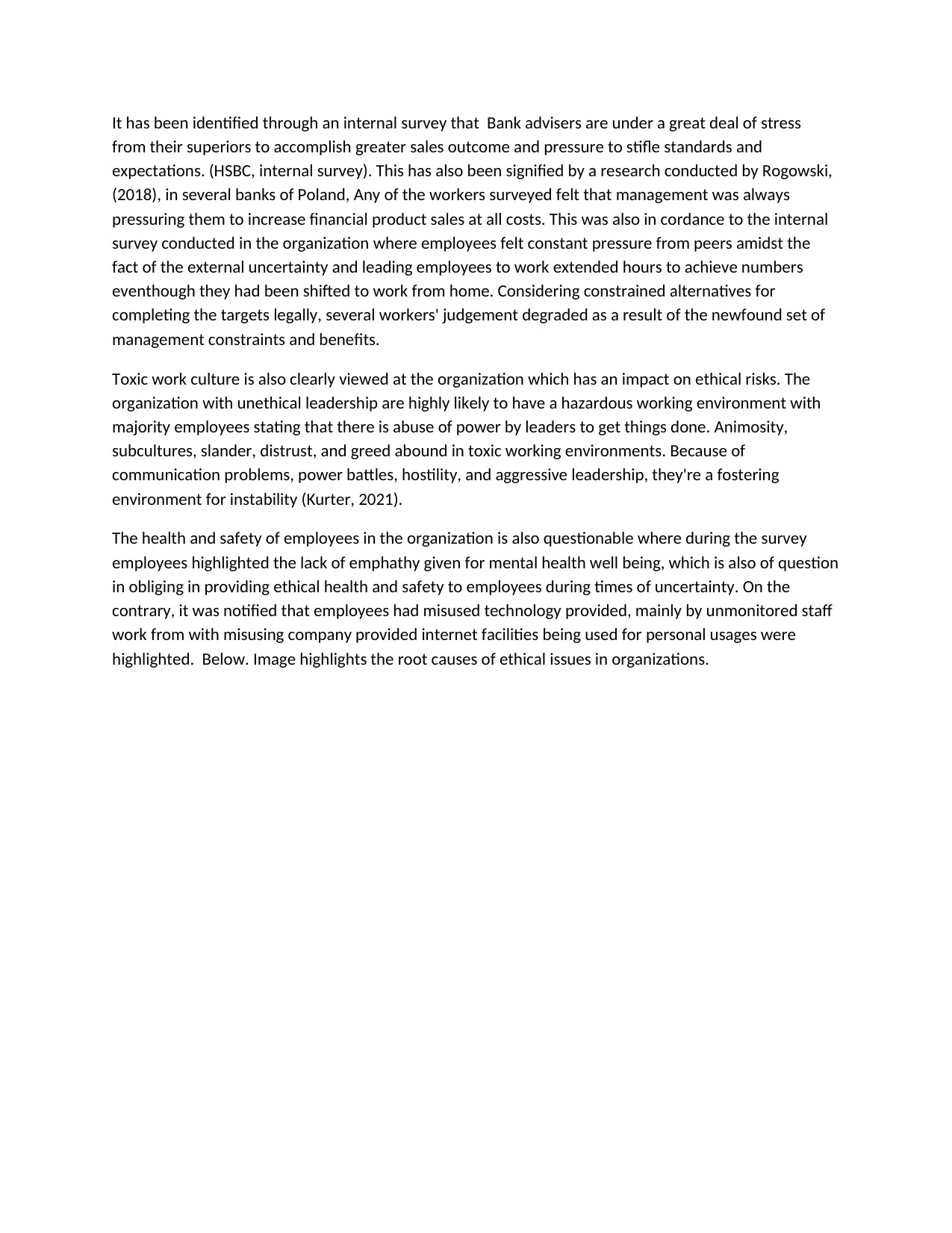
It has been identified through an internal survey that Bank advisers are under a great deal of stress
from their superiors to accomplish greater sales outcome and pressure to stifle standards and
expectations. (HSBC, internal survey). This has also been signified by a research conducted by Rogowski,
(2018), in several banks of Poland, Any of the workers surveyed felt that management was always
pressuring them to increase financial product sales at all costs. This was also in cordance to the internal
survey conducted in the organization where employees felt constant pressure from peers amidst the
fact of the external uncertainty and leading employees to work extended hours to achieve numbers
eventhough they had been shifted to work from home. Considering constrained alternatives for
completing the targets legally, several workers' judgement degraded as a result of the newfound set of
management constraints and benefits.
Toxic work culture is also clearly viewed at the organization which has an impact on ethical risks. The
organization with unethical leadership are highly likely to have a hazardous working environment with
majority employees stating that there is abuse of power by leaders to get things done. Animosity,
subcultures, slander, distrust, and greed abound in toxic working environments. Because of
communication problems, power battles, hostility, and aggressive leadership, they're a fostering
environment for instability (Kurter, 2021).
The health and safety of employees in the organization is also questionable where during the survey
employees highlighted the lack of emphathy given for mental health well being, which is also of question
in obliging in providing ethical health and safety to employees during times of uncertainty. On the
contrary, it was notified that employees had misused technology provided, mainly by unmonitored staff
work from with misusing company provided internet facilities being used for personal usages were
highlighted. Below. Image highlights the root causes of ethical issues in organizations.
from their superiors to accomplish greater sales outcome and pressure to stifle standards and
expectations. (HSBC, internal survey). This has also been signified by a research conducted by Rogowski,
(2018), in several banks of Poland, Any of the workers surveyed felt that management was always
pressuring them to increase financial product sales at all costs. This was also in cordance to the internal
survey conducted in the organization where employees felt constant pressure from peers amidst the
fact of the external uncertainty and leading employees to work extended hours to achieve numbers
eventhough they had been shifted to work from home. Considering constrained alternatives for
completing the targets legally, several workers' judgement degraded as a result of the newfound set of
management constraints and benefits.
Toxic work culture is also clearly viewed at the organization which has an impact on ethical risks. The
organization with unethical leadership are highly likely to have a hazardous working environment with
majority employees stating that there is abuse of power by leaders to get things done. Animosity,
subcultures, slander, distrust, and greed abound in toxic working environments. Because of
communication problems, power battles, hostility, and aggressive leadership, they're a fostering
environment for instability (Kurter, 2021).
The health and safety of employees in the organization is also questionable where during the survey
employees highlighted the lack of emphathy given for mental health well being, which is also of question
in obliging in providing ethical health and safety to employees during times of uncertainty. On the
contrary, it was notified that employees had misused technology provided, mainly by unmonitored staff
work from with misusing company provided internet facilities being used for personal usages were
highlighted. Below. Image highlights the root causes of ethical issues in organizations.
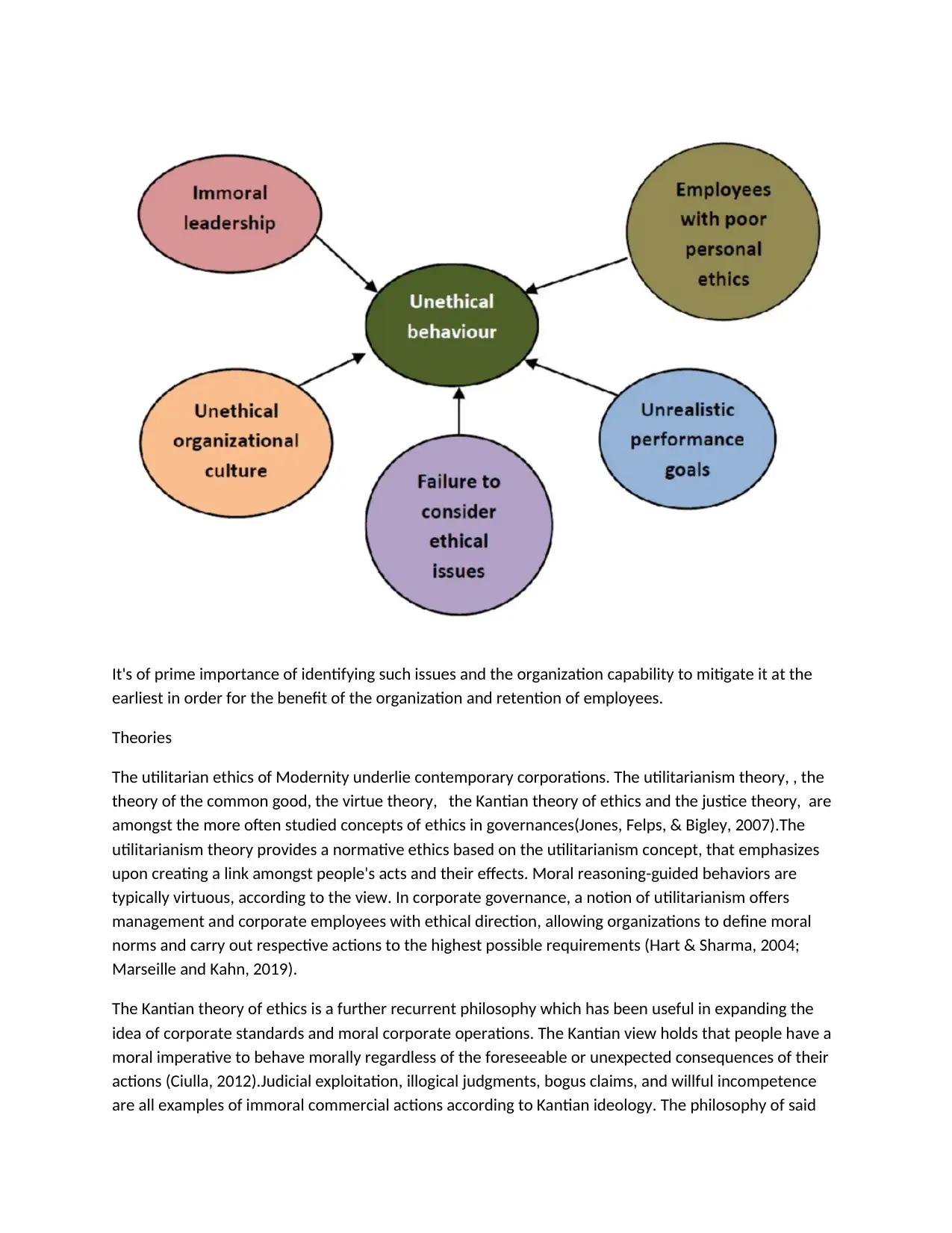
It's of prime importance of identifying such issues and the organization capability to mitigate it at the
earliest in order for the benefit of the organization and retention of employees.
Theories
The utilitarian ethics of Modernity underlie contemporary corporations. The utilitarianism theory, , the
theory of the common good, the virtue theory, the Kantian theory of ethics and the justice theory, are
amongst the more often studied concepts of ethics in governances(Jones, Felps, & Bigley, 2007).The
utilitarianism theory provides a normative ethics based on the utilitarianism concept, that emphasizes
upon creating a link amongst people's acts and their effects. Moral reasoning-guided behaviors are
typically virtuous, according to the view. In corporate governance, a notion of utilitarianism offers
management and corporate employees with ethical direction, allowing organizations to define moral
norms and carry out respective actions to the highest possible requirements (Hart & Sharma, 2004;
Marseille and Kahn, 2019).
The Kantian theory of ethics is a further recurrent philosophy which has been useful in expanding the
idea of corporate standards and moral corporate operations. The Kantian view holds that people have a
moral imperative to behave morally regardless of the foreseeable or unexpected consequences of their
actions (Ciulla, 2012).Judicial exploitation, illogical judgments, bogus claims, and willful incompetence
are all examples of immoral commercial actions according to Kantian ideology. The philosophy of said
earliest in order for the benefit of the organization and retention of employees.
Theories
The utilitarian ethics of Modernity underlie contemporary corporations. The utilitarianism theory, , the
theory of the common good, the virtue theory, the Kantian theory of ethics and the justice theory, are
amongst the more often studied concepts of ethics in governances(Jones, Felps, & Bigley, 2007).The
utilitarianism theory provides a normative ethics based on the utilitarianism concept, that emphasizes
upon creating a link amongst people's acts and their effects. Moral reasoning-guided behaviors are
typically virtuous, according to the view. In corporate governance, a notion of utilitarianism offers
management and corporate employees with ethical direction, allowing organizations to define moral
norms and carry out respective actions to the highest possible requirements (Hart & Sharma, 2004;
Marseille and Kahn, 2019).
The Kantian theory of ethics is a further recurrent philosophy which has been useful in expanding the
idea of corporate standards and moral corporate operations. The Kantian view holds that people have a
moral imperative to behave morally regardless of the foreseeable or unexpected consequences of their
actions (Ciulla, 2012).Judicial exploitation, illogical judgments, bogus claims, and willful incompetence
are all examples of immoral commercial actions according to Kantian ideology. The philosophy of said
⊘ This is a preview!⊘
Do you want full access?
Subscribe today to unlock all pages.

Trusted by 1+ million students worldwide
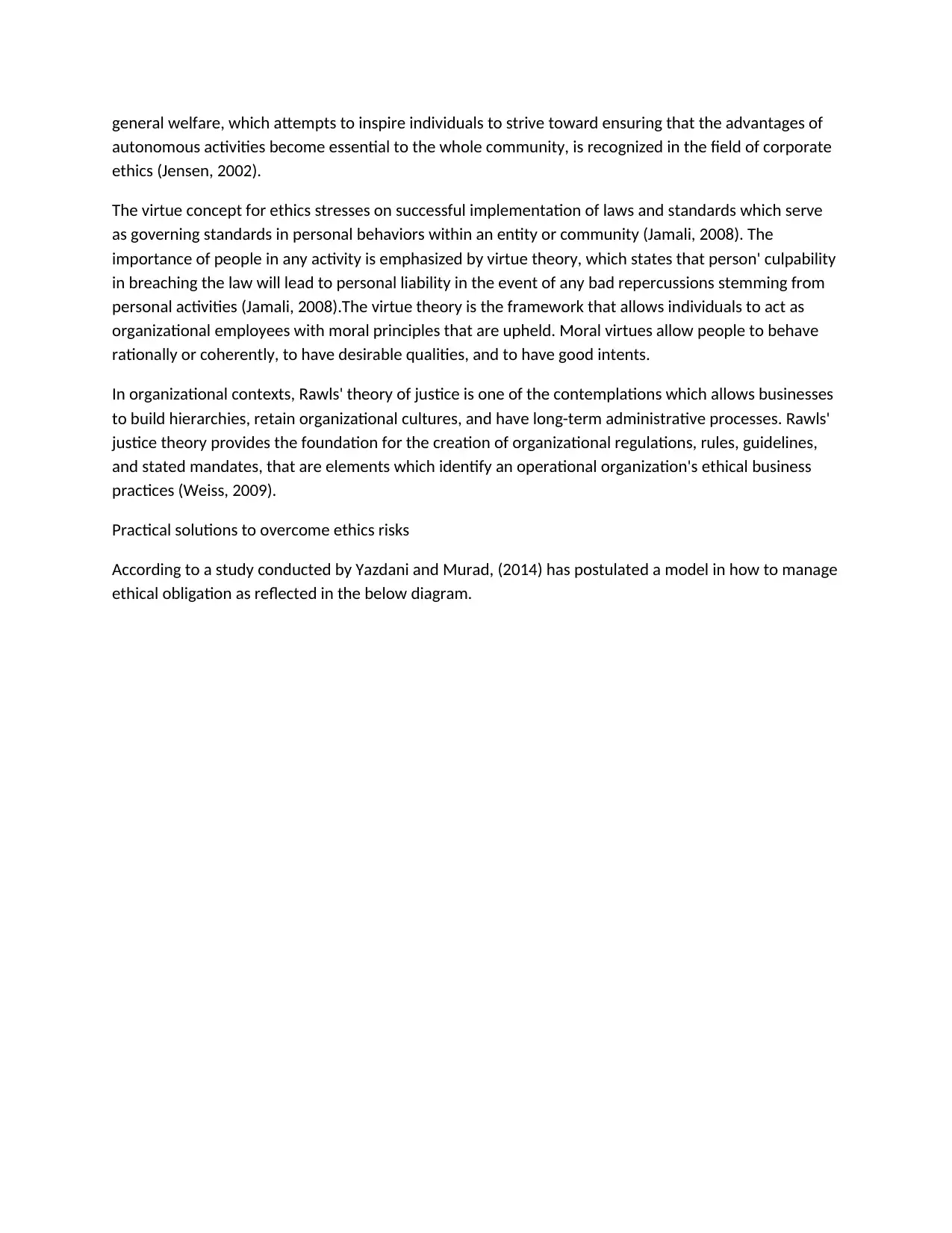
general welfare, which attempts to inspire individuals to strive toward ensuring that the advantages of
autonomous activities become essential to the whole community, is recognized in the field of corporate
ethics (Jensen, 2002).
The virtue concept for ethics stresses on successful implementation of laws and standards which serve
as governing standards in personal behaviors within an entity or community (Jamali, 2008). The
importance of people in any activity is emphasized by virtue theory, which states that person' culpability
in breaching the law will lead to personal liability in the event of any bad repercussions stemming from
personal activities (Jamali, 2008).The virtue theory is the framework that allows individuals to act as
organizational employees with moral principles that are upheld. Moral virtues allow people to behave
rationally or coherently, to have desirable qualities, and to have good intents.
In organizational contexts, Rawls' theory of justice is one of the contemplations which allows businesses
to build hierarchies, retain organizational cultures, and have long-term administrative processes. Rawls'
justice theory provides the foundation for the creation of organizational regulations, rules, guidelines,
and stated mandates, that are elements which identify an operational organization's ethical business
practices (Weiss, 2009).
Practical solutions to overcome ethics risks
According to a study conducted by Yazdani and Murad, (2014) has postulated a model in how to manage
ethical obligation as reflected in the below diagram.
autonomous activities become essential to the whole community, is recognized in the field of corporate
ethics (Jensen, 2002).
The virtue concept for ethics stresses on successful implementation of laws and standards which serve
as governing standards in personal behaviors within an entity or community (Jamali, 2008). The
importance of people in any activity is emphasized by virtue theory, which states that person' culpability
in breaching the law will lead to personal liability in the event of any bad repercussions stemming from
personal activities (Jamali, 2008).The virtue theory is the framework that allows individuals to act as
organizational employees with moral principles that are upheld. Moral virtues allow people to behave
rationally or coherently, to have desirable qualities, and to have good intents.
In organizational contexts, Rawls' theory of justice is one of the contemplations which allows businesses
to build hierarchies, retain organizational cultures, and have long-term administrative processes. Rawls'
justice theory provides the foundation for the creation of organizational regulations, rules, guidelines,
and stated mandates, that are elements which identify an operational organization's ethical business
practices (Weiss, 2009).
Practical solutions to overcome ethics risks
According to a study conducted by Yazdani and Murad, (2014) has postulated a model in how to manage
ethical obligation as reflected in the below diagram.
Paraphrase This Document
Need a fresh take? Get an instant paraphrase of this document with our AI Paraphraser
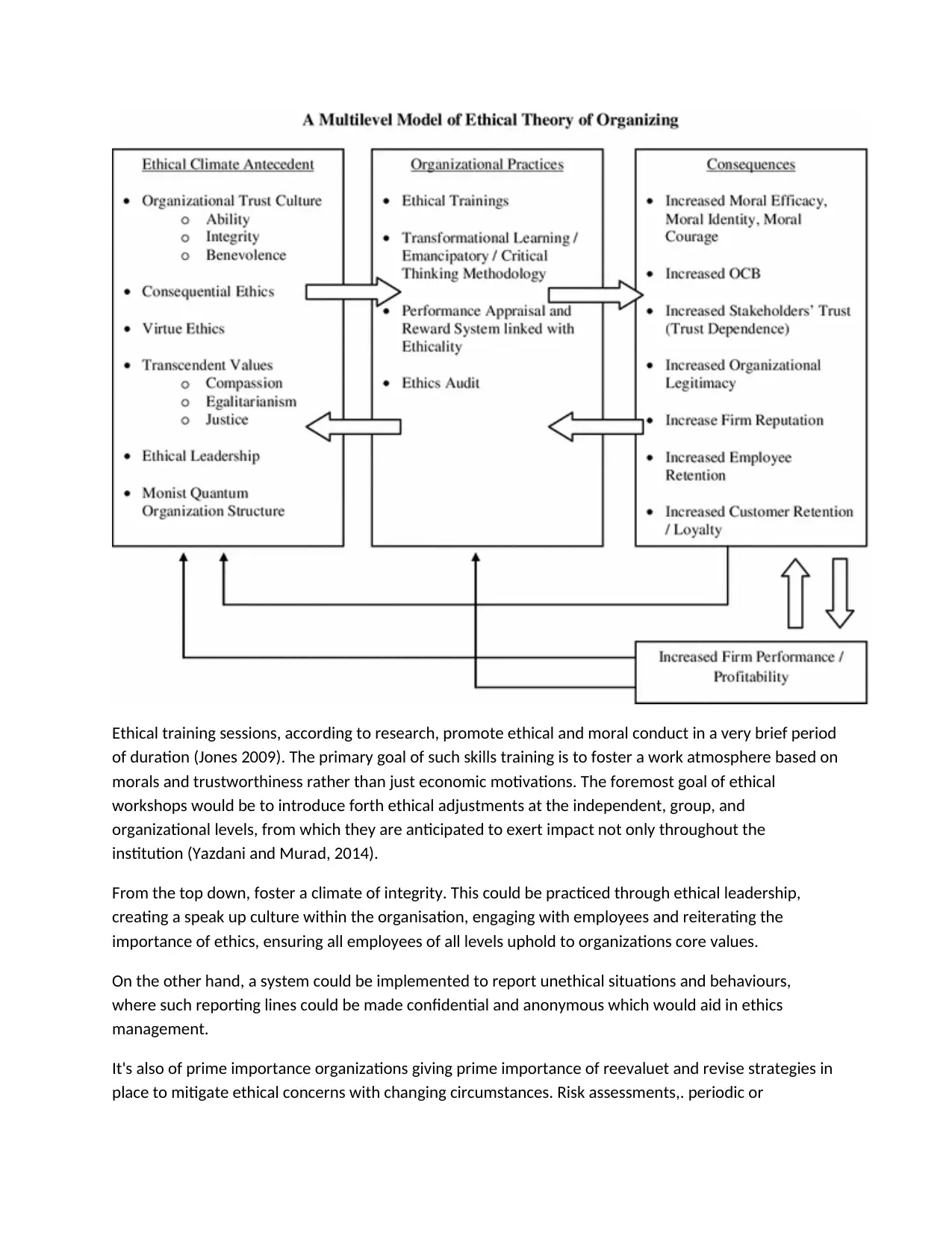
Ethical training sessions, according to research, promote ethical and moral conduct in a very brief period
of duration (Jones 2009). The primary goal of such skills training is to foster a work atmosphere based on
morals and trustworthiness rather than just economic motivations. The foremost goal of ethical
workshops would be to introduce forth ethical adjustments at the independent, group, and
organizational levels, from which they are anticipated to exert impact not only throughout the
institution (Yazdani and Murad, 2014).
From the top down, foster a climate of integrity. This could be practiced through ethical leadership,
creating a speak up culture within the organisation, engaging with employees and reiterating the
importance of ethics, ensuring all employees of all levels uphold to organizations core values.
On the other hand, a system could be implemented to report unethical situations and behaviours,
where such reporting lines could be made confidential and anonymous which would aid in ethics
management.
It's also of prime importance organizations giving prime importance of reevaluet and revise strategies in
place to mitigate ethical concerns with changing circumstances. Risk assessments,. periodic or
of duration (Jones 2009). The primary goal of such skills training is to foster a work atmosphere based on
morals and trustworthiness rather than just economic motivations. The foremost goal of ethical
workshops would be to introduce forth ethical adjustments at the independent, group, and
organizational levels, from which they are anticipated to exert impact not only throughout the
institution (Yazdani and Murad, 2014).
From the top down, foster a climate of integrity. This could be practiced through ethical leadership,
creating a speak up culture within the organisation, engaging with employees and reiterating the
importance of ethics, ensuring all employees of all levels uphold to organizations core values.
On the other hand, a system could be implemented to report unethical situations and behaviours,
where such reporting lines could be made confidential and anonymous which would aid in ethics
management.
It's also of prime importance organizations giving prime importance of reevaluet and revise strategies in
place to mitigate ethical concerns with changing circumstances. Risk assessments,. periodic or
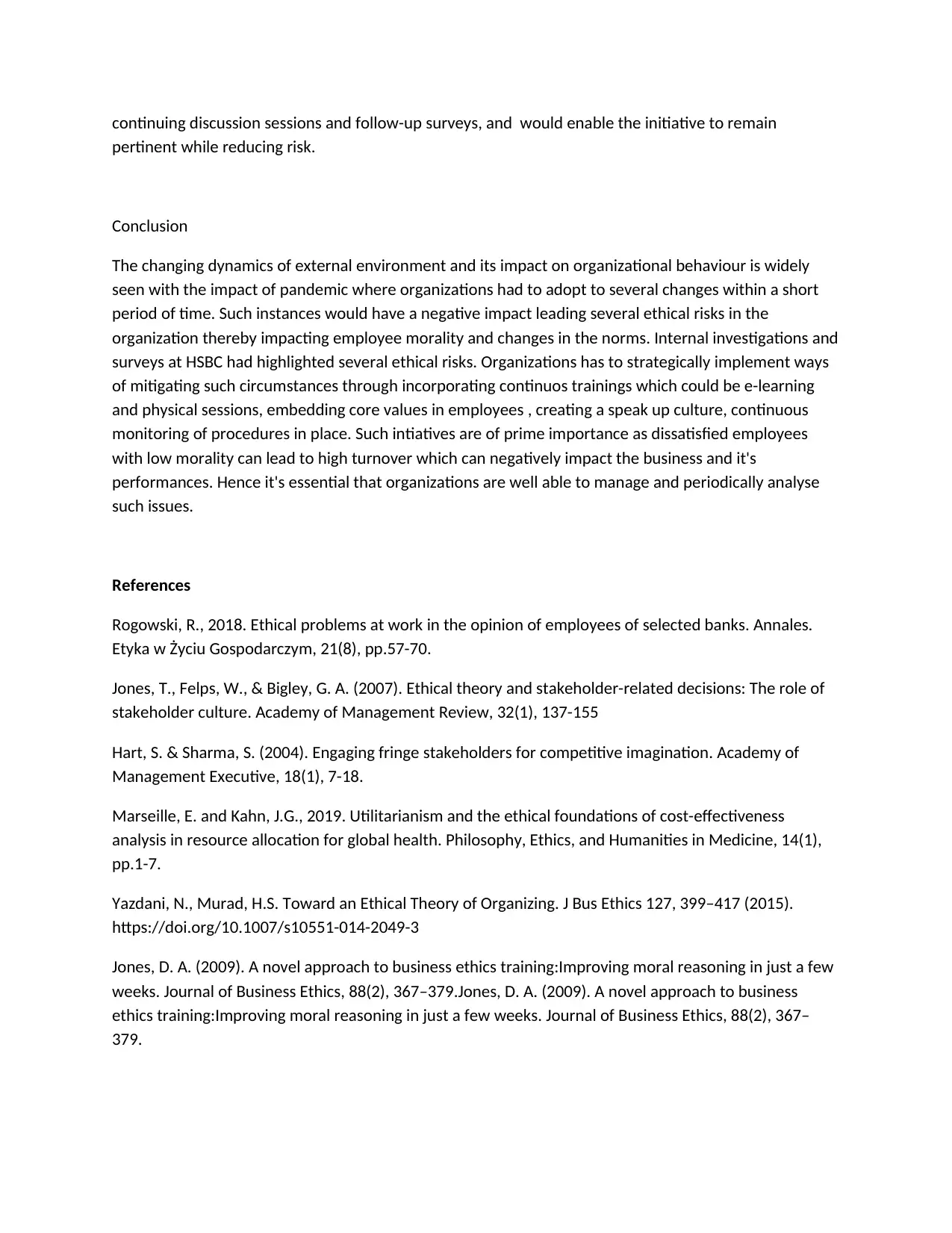
continuing discussion sessions and follow-up surveys, and would enable the initiative to remain
pertinent while reducing risk.
Conclusion
The changing dynamics of external environment and its impact on organizational behaviour is widely
seen with the impact of pandemic where organizations had to adopt to several changes within a short
period of time. Such instances would have a negative impact leading several ethical risks in the
organization thereby impacting employee morality and changes in the norms. Internal investigations and
surveys at HSBC had highlighted several ethical risks. Organizations has to strategically implement ways
of mitigating such circumstances through incorporating continuos trainings which could be e-learning
and physical sessions, embedding core values in employees , creating a speak up culture, continuous
monitoring of procedures in place. Such intiatives are of prime importance as dissatisfied employees
with low morality can lead to high turnover which can negatively impact the business and it's
performances. Hence it's essential that organizations are well able to manage and periodically analyse
such issues.
References
Rogowski, R., 2018. Ethical problems at work in the opinion of employees of selected banks. Annales.
Etyka w Życiu Gospodarczym, 21(8), pp.57-70.
Jones, T., Felps, W., & Bigley, G. A. (2007). Ethical theory and stakeholder-related decisions: The role of
stakeholder culture. Academy of Management Review, 32(1), 137-155
Hart, S. & Sharma, S. (2004). Engaging fringe stakeholders for competitive imagination. Academy of
Management Executive, 18(1), 7-18.
Marseille, E. and Kahn, J.G., 2019. Utilitarianism and the ethical foundations of cost-effectiveness
analysis in resource allocation for global health. Philosophy, Ethics, and Humanities in Medicine, 14(1),
pp.1-7.
Yazdani, N., Murad, H.S. Toward an Ethical Theory of Organizing. J Bus Ethics 127, 399–417 (2015).
https://doi.org/10.1007/s10551-014-2049-3
Jones, D. A. (2009). A novel approach to business ethics training:Improving moral reasoning in just a few
weeks. Journal of Business Ethics, 88(2), 367–379.Jones, D. A. (2009). A novel approach to business
ethics training:Improving moral reasoning in just a few weeks. Journal of Business Ethics, 88(2), 367–
379.
pertinent while reducing risk.
Conclusion
The changing dynamics of external environment and its impact on organizational behaviour is widely
seen with the impact of pandemic where organizations had to adopt to several changes within a short
period of time. Such instances would have a negative impact leading several ethical risks in the
organization thereby impacting employee morality and changes in the norms. Internal investigations and
surveys at HSBC had highlighted several ethical risks. Organizations has to strategically implement ways
of mitigating such circumstances through incorporating continuos trainings which could be e-learning
and physical sessions, embedding core values in employees , creating a speak up culture, continuous
monitoring of procedures in place. Such intiatives are of prime importance as dissatisfied employees
with low morality can lead to high turnover which can negatively impact the business and it's
performances. Hence it's essential that organizations are well able to manage and periodically analyse
such issues.
References
Rogowski, R., 2018. Ethical problems at work in the opinion of employees of selected banks. Annales.
Etyka w Życiu Gospodarczym, 21(8), pp.57-70.
Jones, T., Felps, W., & Bigley, G. A. (2007). Ethical theory and stakeholder-related decisions: The role of
stakeholder culture. Academy of Management Review, 32(1), 137-155
Hart, S. & Sharma, S. (2004). Engaging fringe stakeholders for competitive imagination. Academy of
Management Executive, 18(1), 7-18.
Marseille, E. and Kahn, J.G., 2019. Utilitarianism and the ethical foundations of cost-effectiveness
analysis in resource allocation for global health. Philosophy, Ethics, and Humanities in Medicine, 14(1),
pp.1-7.
Yazdani, N., Murad, H.S. Toward an Ethical Theory of Organizing. J Bus Ethics 127, 399–417 (2015).
https://doi.org/10.1007/s10551-014-2049-3
Jones, D. A. (2009). A novel approach to business ethics training:Improving moral reasoning in just a few
weeks. Journal of Business Ethics, 88(2), 367–379.Jones, D. A. (2009). A novel approach to business
ethics training:Improving moral reasoning in just a few weeks. Journal of Business Ethics, 88(2), 367–
379.
⊘ This is a preview!⊘
Do you want full access?
Subscribe today to unlock all pages.

Trusted by 1+ million students worldwide
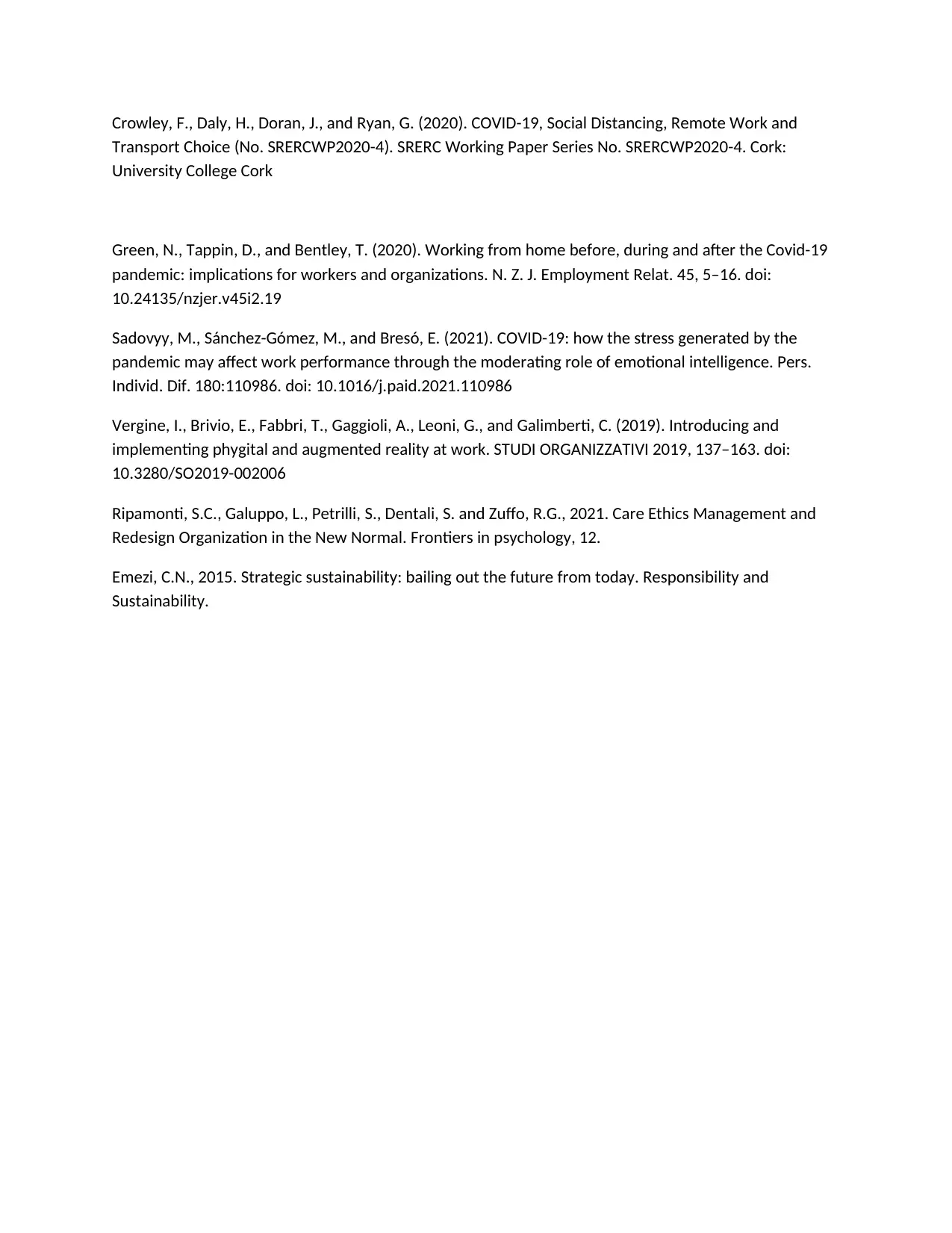
Crowley, F., Daly, H., Doran, J., and Ryan, G. (2020). COVID-19, Social Distancing, Remote Work and
Transport Choice (No. SRERCWP2020-4). SRERC Working Paper Series No. SRERCWP2020-4. Cork:
University College Cork
Green, N., Tappin, D., and Bentley, T. (2020). Working from home before, during and after the Covid-19
pandemic: implications for workers and organizations. N. Z. J. Employment Relat. 45, 5–16. doi:
10.24135/nzjer.v45i2.19
Sadovyy, M., Sánchez-Gómez, M., and Bresó, E. (2021). COVID-19: how the stress generated by the
pandemic may affect work performance through the moderating role of emotional intelligence. Pers.
Individ. Dif. 180:110986. doi: 10.1016/j.paid.2021.110986
Vergine, I., Brivio, E., Fabbri, T., Gaggioli, A., Leoni, G., and Galimberti, C. (2019). Introducing and
implementing phygital and augmented reality at work. STUDI ORGANIZZATIVI 2019, 137–163. doi:
10.3280/SO2019-002006
Ripamonti, S.C., Galuppo, L., Petrilli, S., Dentali, S. and Zuffo, R.G., 2021. Care Ethics Management and
Redesign Organization in the New Normal. Frontiers in psychology, 12.
Emezi, C.N., 2015. Strategic sustainability: bailing out the future from today. Responsibility and
Sustainability.
Transport Choice (No. SRERCWP2020-4). SRERC Working Paper Series No. SRERCWP2020-4. Cork:
University College Cork
Green, N., Tappin, D., and Bentley, T. (2020). Working from home before, during and after the Covid-19
pandemic: implications for workers and organizations. N. Z. J. Employment Relat. 45, 5–16. doi:
10.24135/nzjer.v45i2.19
Sadovyy, M., Sánchez-Gómez, M., and Bresó, E. (2021). COVID-19: how the stress generated by the
pandemic may affect work performance through the moderating role of emotional intelligence. Pers.
Individ. Dif. 180:110986. doi: 10.1016/j.paid.2021.110986
Vergine, I., Brivio, E., Fabbri, T., Gaggioli, A., Leoni, G., and Galimberti, C. (2019). Introducing and
implementing phygital and augmented reality at work. STUDI ORGANIZZATIVI 2019, 137–163. doi:
10.3280/SO2019-002006
Ripamonti, S.C., Galuppo, L., Petrilli, S., Dentali, S. and Zuffo, R.G., 2021. Care Ethics Management and
Redesign Organization in the New Normal. Frontiers in psychology, 12.
Emezi, C.N., 2015. Strategic sustainability: bailing out the future from today. Responsibility and
Sustainability.
1 out of 7
Related Documents
Your All-in-One AI-Powered Toolkit for Academic Success.
+13062052269
info@desklib.com
Available 24*7 on WhatsApp / Email
![[object Object]](/_next/static/media/star-bottom.7253800d.svg)
Unlock your academic potential
Copyright © 2020–2026 A2Z Services. All Rights Reserved. Developed and managed by ZUCOL.





